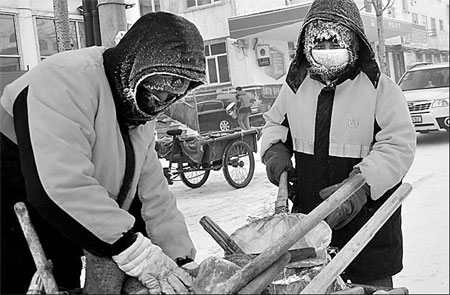Workers in extreme cold need better protection
Updated: 2013-04-02 07:45
By Chen Xin in Beijing and Liu Ce in Shenyang (China Daily)
|
||||||||
|
Braving temperatures of -40 C, sanitation workers perform their duties on a street in Hulunbuir, the Inner Mongolia autonomous region. Yu Changjun / for China Daily |
Workers exposed to low temperatures should be better protected by law and given subsidies, political advisers said.
Ge Xuchen leaves home at 3 am every day and spends an hour riding a bike to the 2.5-kilometer street he cleans in Shenyang, capital of Liao-ning province.
The 52 years old works about 12 hours a day and sometimes does not finish until late at night.
"Winter is the hardest season, as it's extremely cold, and I often feel sleepy working at night," Ge said. "Cars speed along the road, and I feel scared sometimes."
He works round-the-clock when it snows, and he still feels cold, even in two down jackets. "I have to keep moving to avoid freezing," he said.
After just four years working as a cleaner, Ge said he has been diagnosed with rheumatism and arthritis. Most people only keep the job for two years.
"I'd like my salary to increase a little and for my employer to set up more shelters for us to rest and get hot water during breaks," he said.
Ge earns 1,400 yuan ($220) a month. The average wage in the city was 3,800 yuan in 2012.
In Shenyang, winter can last up to four months, with temperatures dropping as low as -30 C. There are 9,500 sanitation workers in Shenyang, authorities said.
Wang Bing, who is in his 30s, is a construction worker in Shenyang. "Construction projects are always suspended in the coldest season, but we still work in -10 C weather," he said. "Sometimes it's so cold that I can't feel my hands."
His employer gives out cotton gloves and caps for workers in winter, Wang said. "But I'd like to get a subsidy from the boss because working in cold weather is really not easy."
Di Yingqi, a member of the Chinese People's Political Consultative Conference National Committee, the top advisory body, said it is important to lay out regulations to protect the rights of workers exposed to low temperatures.
"There's a gap in rules or laws that oversee workers' labor rights protection in cold weather," he said.
A large number of people including sanitation workers, traffic police officers, construction workers and geological survey staff work in low temperatures and face threats in such environments, said Di, a law professor at Henan University of Economics and Law.
"Such regulations should not only stipulate employers' responsibility of providing workers with necessary labor protection facilities but also offer low-temperature subsidies," he said.
Duan Dunhou, a member of the CPPCC National Committee and vice-chairman of the All-China Federation of Trade Unions, suggested making such regulations according to a revised heat control regulation that took effect in June.
The regulation stipulates that employers should grant subsidies to people who work outdoors when temperatures are above 35 C, and inside workplaces where the temperature is above 33 C. Labor authorities are responsible for setting subsidy standards, it states.
For example, in Jiangxi province, workers can get a four-month subsidy that provides 240 yuan each month; in Sichuan province, the subsidy ranges from 8 to 12 yuan a day.
In those places, labor authorities will punish employers who do not provide the subsidy.
Workers should stop working when the temperature hits 40 C, according to the heat control regulation.
Employers should not deduct workers' pay if their duties are suspended due to hot weather, it says.
In the Inner Mongolia autonomous region, about 200,000 people work in low temperatures, and many of them are not under proper occupational health supervision and do not receive sufficient protection facilities, Duan Dunhou said.
Workers exposed to low temperatures are vulnerable to frostbite and cardiovascular and cerebrovascular diseases, he said.
"The anticipated regulation should clearly define a low-temperature work environment and people applicable to low-temperature workplaces. It should specify labor protection measures employers have to take and employers' responsibility to provide facilities and subsidy as well as laborers' work and rest time," he said.
Duan said the rules should mandate companies to limit employees' chances of exposure to low temperatures.
Government departments should strengthen enforcement of labor and occupational disease prevention laws, he added.
Contact the writers at chenxin1@chinadaily.com.cn and liuce@chinadaily.com.cn
(China Daily 04/02/2013 page4)

 In Photos: 7.0-magnitude quake hits Sichuan
In Photos: 7.0-magnitude quake hits Sichuan
 Li Na on Time cover, makes influential 100 list
Li Na on Time cover, makes influential 100 list
 FBI releases photos of 2 Boston bombings suspects
FBI releases photos of 2 Boston bombings suspects
 World's wackiest hairstyles
World's wackiest hairstyles
 Sandstorms strike Northwest China
Sandstorms strike Northwest China
 Never-seen photos of Madonna on display
Never-seen photos of Madonna on display
 H7N9 outbreak linked to waterfowl migration
H7N9 outbreak linked to waterfowl migration
 Dozens feared dead in Texas plant blast
Dozens feared dead in Texas plant blast
Most Viewed
Editor's Picks

|

|

|

|

|

|
Today's Top News
Live report: 7.0-magnitude quake hits Sichuan, heavy casualties feared
Boston suspect cornered on boat
Cross-talk artist helps to spread the word
'Green' awareness levels drop in Beijing
Palace Museum spruces up
First couple on Time's list of most influential
H7N9 flu transmission studied
Trading channels 'need to broaden'
US Weekly

|

|








